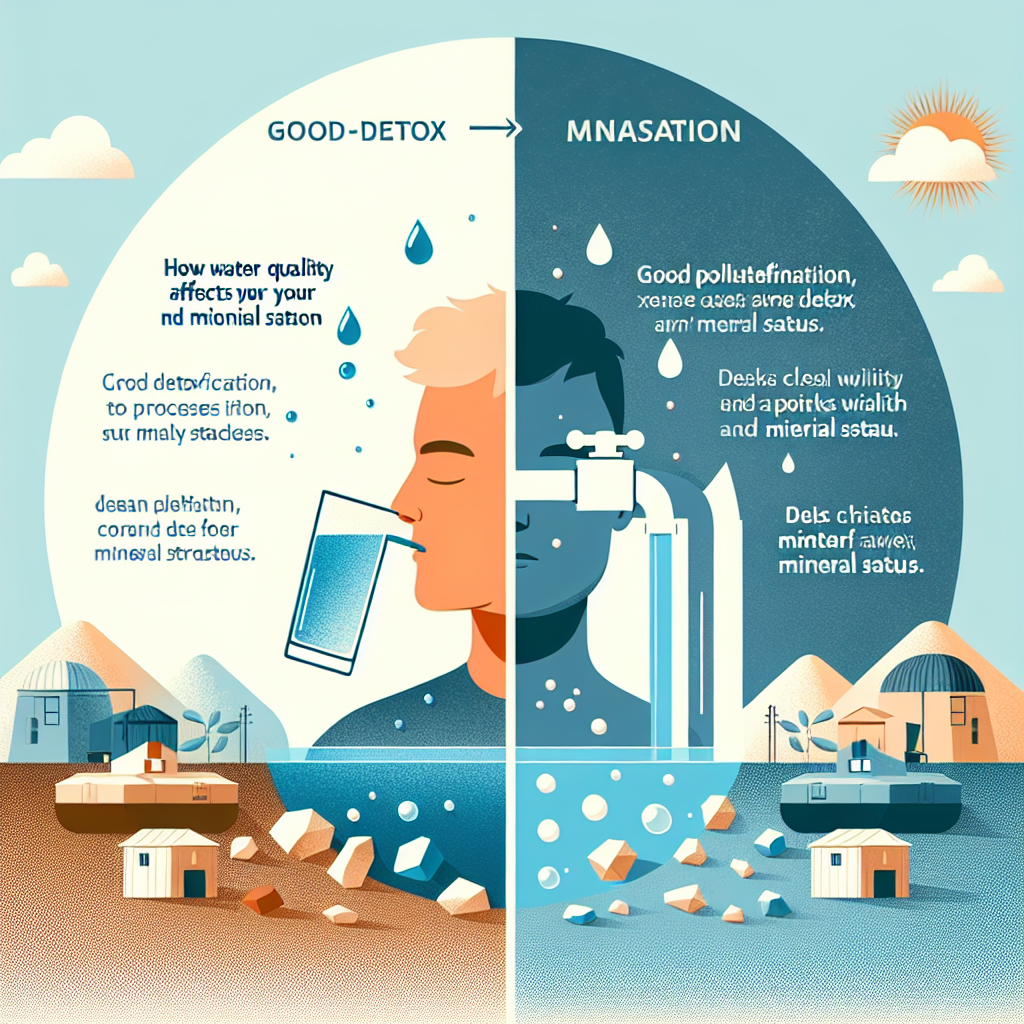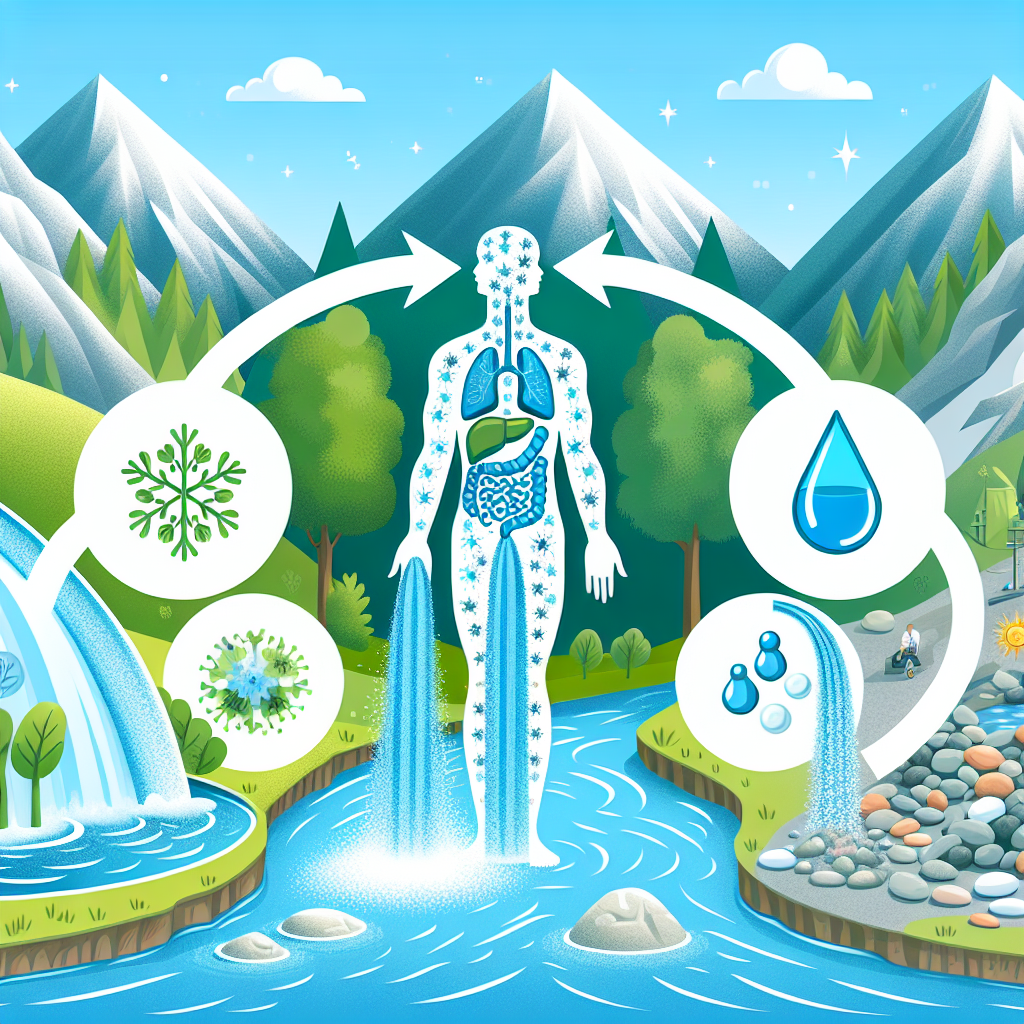How Water Quality Affects Your Detox and Mineral Status

Discover how water quality can significantly impact your detox and mineral status. Learn more about the importance of clean, quality water for your overall health and wellness. Don’t wait, take control of your health today. Click here to get started.
Understanding the Impact of Water Quality on Your Detoxification Process
Water is an essential component of life, playing a crucial role in various bodily functions, including detoxification and mineral absorption. However, the quality of the water we consume can significantly impact these processes. Understanding the impact of water quality on your detoxification process is therefore vital for maintaining optimal health.
Detoxification is a natural process that our bodies undertake to eliminate toxins. These toxins can come from various sources, such as the food we eat, the air we breathe, and the water we drink. The liver, kidneys, and skin are primarily responsible for this detoxification process. Water plays a critical role in this process by helping to flush out these toxins from our bodies. However, if the water we consume is contaminated with harmful substances, it can hinder this detoxification process and even introduce new toxins into our bodies.
Water quality can be compromised by various factors, including pollution, inadequate treatment, and the presence of harmful microorganisms. For instance, water contaminated with heavy metals such as lead, mercury, and arsenic can be detrimental to our health. These heavy metals can accumulate in our bodies over time, leading to various health problems, including kidney damage, neurological disorders, and even cancer. Moreover, they can interfere with the detoxification process by overburdening our detox organs, making it harder for our bodies to eliminate other toxins.
Furthermore, water quality can also affect our mineral status. Minerals are essential nutrients that our bodies need to function properly. They play a crucial role in various bodily functions, including bone health, heart health, and immune function. Water is a significant source of these minerals. However, if the water we consume is of poor quality, it can affect our mineral intake.
For instance, hard water, which is high in minerals such as calcium and magnesium, can be beneficial for our health. However, if the water is too hard, it can lead to mineral overload, which can cause various health problems, including kidney stones. On the other hand, soft water, which is low in minerals, can lead to mineral deficiencies if it is our primary source of hydration.
Moreover, water contaminated with harmful substances can also affect our mineral absorption. For instance, water contaminated with lead can interfere with the absorption of essential minerals such as calcium and iron, leading to deficiencies. Similarly, water contaminated with harmful microorganisms can cause gastrointestinal problems, which can affect our ability to absorb minerals.
In conclusion, the quality of the water we consume can significantly impact our detoxification process and mineral status. Therefore, it is essential to ensure that the water we drink is of good quality. This can be achieved by using water filters, regularly testing our water for contaminants, and consuming a balanced diet to ensure we get enough minerals. By doing so, we can support our bodies’ natural detoxification process and maintain optimal mineral status, contributing to our overall health and well-being.
The Role of Water Purity in Maintaining Optimal Mineral Status

Water is the essence of life, and its quality plays a pivotal role in our overall health and wellbeing. One aspect of health that is significantly influenced by the quality of water we consume is our detoxification process and mineral status. This article will delve into the role of water purity in maintaining optimal mineral status and how it affects our body’s detoxification process.
Water is a universal solvent, meaning it can dissolve more substances than any other liquid. This property makes it an excellent medium for transporting nutrients, including minerals, throughout our bodies. However, this also means that water can carry harmful substances, such as heavy metals and other toxins. Therefore, the purity of the water we consume directly impacts our health.
Minerals are essential for various bodily functions, including bone formation, heart function, and energy production. They are also crucial for the proper functioning of our nervous system. The minerals we need are often present in the water we drink. However, the quality of water can significantly affect the mineral content. Pure water, free from contaminants, can provide a good source of essential minerals like calcium, magnesium, and potassium. On the other hand, impure water may contain harmful substances that can interfere with our body’s ability to absorb and utilize these minerals.
The purity of water also plays a crucial role in our body’s detoxification process. Our bodies are constantly working to eliminate toxins that we ingest from our environment, food, and water. The kidneys, in particular, rely heavily on water to flush out these toxins. If the water we consume is contaminated, it can overburden our detoxification system, leading to a buildup of toxins in our bodies. This can result in various health issues, including fatigue, headaches, and weakened immunity.
Moreover, impure water can also disrupt the balance of good bacteria in our gut. A healthy gut microbiome is essential for effective detoxification as it aids in breaking down toxins and eliminating them from our bodies. Drinking contaminated water can harm these beneficial bacteria, impairing our body’s detoxification process.
So, how can we ensure that the water we consume is pure and beneficial for our health? One way is to invest in a high-quality water filtration system. These systems can remove a wide range of contaminants, including heavy metals, bacteria, and chemicals, ensuring that the water you drink is clean and safe. Additionally, regular testing of your water source can help identify any potential issues and allow for timely intervention.
In conclusion, the quality of water we consume plays a significant role in maintaining our mineral status and supporting our body’s detoxification process. By ensuring that our water is pure and free from harmful contaminants, we can support our body’s ability to absorb essential minerals and effectively eliminate toxins. This, in turn, can contribute to improved overall health and wellbeing. Therefore, it is crucial to prioritize water purity and take necessary measures to ensure the quality of the water we consume.
How Contaminated Water Can Hinder Your Body’s Detox and Mineral Absorption
Water quality plays a pivotal role in our overall health, particularly in relation to our body’s detoxification processes and mineral absorption. The quality of the water we consume can either aid or hinder these essential bodily functions. This article will delve into how contaminated water can negatively impact your body’s detoxification and mineral absorption capabilities.
Water is the primary medium through which our body expels waste and toxins. It aids in digestion, helps transport nutrients, and maintains the balance of bodily fluids. However, when the water we consume is contaminated, it can disrupt these processes, leading to a myriad of health issues. Contaminated water often contains harmful substances such as heavy metals, chemicals, and microorganisms. These contaminants can overload our body’s detoxification system, making it harder for the body to eliminate toxins effectively.
Heavy metals such as lead, mercury, and arsenic, often found in contaminated water, can accumulate in the body over time. These metals can interfere with the body’s natural detoxification processes by binding to enzymes that are crucial for detoxification. This can lead to a buildup of toxins in the body, causing various health problems such as fatigue, digestive issues, and even neurological damage.
Moreover, these heavy metals can also compete with essential minerals for absorption in the body. For instance, lead can interfere with the absorption of calcium, a mineral vital for bone health. Similarly, mercury can inhibit the absorption of selenium, a mineral that plays a crucial role in thyroid function. This competition can lead to mineral deficiencies, further exacerbating health issues.
Chemicals found in contaminated water, such as pesticides and industrial pollutants, can also disrupt the body’s detoxification processes. These chemicals can damage the liver, the body’s primary detoxification organ, impairing its ability to filter out toxins. Additionally, these chemicals can interfere with the absorption of essential minerals, leading to deficiencies.
Microorganisms, such as bacteria and parasites, present in contaminated water can also pose a threat to our health. These microorganisms can cause infections, leading to an overactive immune system. This can divert the body’s resources away from detoxification and mineral absorption, leading to an accumulation of toxins and potential mineral deficiencies.
Furthermore, contaminated water can also disrupt the balance of our gut microbiota, the community of beneficial bacteria in our gut. A healthy gut microbiota is essential for effective detoxification and mineral absorption. However, harmful substances in contaminated water can kill off beneficial bacteria, disrupting this balance. This can impair the body’s ability to detoxify and absorb minerals, leading to a host of health problems.
In conclusion, the quality of the water we consume plays a crucial role in our body’s detoxification processes and mineral absorption. Consuming contaminated water can overload our detoxification system, interfere with mineral absorption, and disrupt our gut microbiota, leading to various health issues. Therefore, it is essential to ensure that the water we consume is of high quality. This can be achieved by using water purification systems, consuming bottled water from trusted sources, or boiling tap water before consumption. By doing so, we can support our body’s detoxification processes, promote optimal mineral absorption, and maintain our overall health.